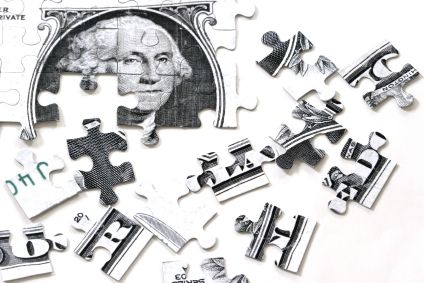
FOR A BUILDING to withstand the extreme winds of a hurricane or tornado, it needs to have a strong foundation and solid beams holding it up. It is the same with a business. Similarly, like a tree that experiences ever-changing weather conditions, businesses are also affected by changes in the market. When the market conditions are good, they flourish. When the conditions are adverse, however, businesses typically suffer. At present, the markets may be experiencing significant economic growth, but at any given time, this may not be the case. Things can change in an instant. You need to be ready.
The wake of an economic crash can leave people and business floating in choppy waters. People may lose their jobs or businesses may shut down entire offices during a deteriorating economy. The fear of job loss should inspire one to further his or her career. Make yourself valuable; further your education and experience. This will help you to avoid being among those who receive a pink slip when the time comes for removing excess workers. It is in your best interest to shape your career in regard to what the market may demand. It is wise not to rely on your organization for its economic direction. Always develop your own inner-drive of what you want to achieve in your career and strive to obtain it.
It is in your best interest to be well-versed in the current skills of your career. Keep in mind your current abilities and skill-set, as well as the advancement of technology. Also, know the kind of professional certifications you have or may need to make yourself a more competitive player in your industry. Consider the skills you have that others in your occupation may not. This may improve your fate in case the market crumbles or diminishes.
Define your career objectives and goals in detail. Your career objectives should be long-term so that they can act as a building block to the growth of your career. They should be personal and precise, so that you will be motivated to accomplish them. By doing this, you will avoid being a target and it increases your odds of keeping your job, thus putting you in an excellent position to secure your position no matter what the ever-changing behavior of the market is. These goals and objectives should be flexible and should be able to adapt to any unexpected market changes as well.
It is a good idea to have a contingency plan for your career by having a well-connected networking group. This, in some cases, means that you should be trained from a seasoned individual that has been in the same industry as you for a much longer period of time. This mentor has been through all the trials and tribulations or recent economic activity and may guide you on what and what not to do to succeed in that particular industry. Everyone in his or her career should have a mentor; this will help to support and develop your skills in your occupation. Many seasoned people in business agree that often, you are a product of your environment, and if you surround yourself with successful people, you, in turn, will become successful yourself. This network can be built by associating with other professionals in your area of specialization. It is advisable to have an up-to-date resume so that you can easily compete with others in your industry. Try and make use of the internet to establish a strong networking channel, even on social networking sites, e.g. Facebook (www.Facebook.com), Linkedin (www.linkedin.com), or Twitter (www.twitter.com).
Have a long-term career training program in place. This program will help to keep you updated on skills that you often use that may have changed in the marketplace. Try to get into an updated training program or educate yourself by reading magazines and books associated with your industry. I know people that commit to reading two books a month about their field and they have had great success with it. You can also select to get into professional groups, which will enable you to network with people from different parts of the world who are also experts in your industry.
It is in your best interest to be well-versed in the current skills of your career. Keep in mind your current abilities and skill-set, as well as the advancement of technology. Also, know the kind of professional certifications you have or may need to make yourself a more competitive player in your industry. Consider the skills you have that others in your occupation may not. This may improve your fate in case the market crumbles or diminishes.
Define your career objectives and goals in detail. Your career objectives should be long-term so that they can act as a building block to the growth of your career. They should be personal and precise, so that you will be motivated to accomplish them. By doing this, you will avoid being a target and it increases your odds of keeping your job, thus putting you in an excellent position to secure your position no matter what the ever-changing behavior of the market is. These goals and objectives should be flexible and should be able to adapt to any unexpected market changes as well.
It is a good idea to have a contingency plan for your career by having a well-connected networking group. This, in some cases, means that you should be trained from a seasoned individual that has been in the same industry as you for a much longer period of time. This mentor has been through all the trials and tribulations or recent economic activity and may guide you on what and what not to do to succeed in that particular industry. Everyone in his or her career should have a mentor; this will help to support and develop your skills in your occupation. Many seasoned people in business agree that often, you are a product of your environment, and if you surround yourself with successful people, you, in turn, will become successful yourself. This network can be built by associating with other professionals in your area of specialization. It is advisable to have an up-to-date resume so that you can easily compete with others in your industry. Try and make use of the internet to establish a strong networking channel, even on social networking sites, e.g. Facebook (www.Facebook.com), Linkedin (www.linkedin.com), or Twitter (www.twitter.com).
Have a long-term career training program in place. This program will help to keep you updated on skills that you often use that may have changed in the marketplace. Try to get into an updated training program or educate yourself by reading magazines and books associated with your industry. I know people that commit to reading two books a month about their field and they have had great success with it. You can also select to get into professional groups, which will enable you to network with people from different parts of the world who are also experts in your industry.
Is your business ready for those same economic challenges?
Unfortunately, a financial crisis normally affects the small businesses more than the larger ones. Larger businesses have, typically, been able to spread out their assets into more than one industry, product, office, and even country. The “Mom-and-Pop” businesses are the worst affected by economic catastrophe. For the reasons listed above, it’s extremely difficult to compete with larger businesses because they can afford to take losses and still survive through those difficult times. The greatest asset small businesses have is valued customers and unleveraged assets. If your shop is paid off, you are much more likely to survive an economic downturn because as long as you’re paying your bills, you can keep your doors open and continue to serve your customers. Also, if you are in the type of business that provides an intangible service, e.g. graphic design, architectural design, legal services, something to consider is closing your storefront and sending everyone home with their equipment. The conversion to a virtual office is a great way to keep your business afloat, keep from having to lay off your employees, and get out from under your real estate or rent payment, which is typically one of a business’ greatest costs.
If you are reading this in a time of economic downturn and have enough capital available to expand, my advice is this—DO IT!!! If you can afford to take advantage of downed market, now is the best time to expand because everything’s cheap. Labor is cheap, land is cheap, and products are cheap. You can probably get a great deal on a long-term lease agreement with a building or shopping center because of the large amount of vacancy that is taking place on account of the economic downturn. Also, keeping in mind that, unfortunately, large amounts of people are unemployed, this gives you an advantage to hire more qualified employees at a fraction of the rate that it would normally cost your business. At that point, you can then take their expertise to help grow your business to your desired level.
If you are reading this in a time of economic downturn and have enough capital available to expand, my advice is this—DO IT!!! If you can afford to take advantage of downed market, now is the best time to expand because everything’s cheap. Labor is cheap, land is cheap, and products are cheap. You can probably get a great deal on a long-term lease agreement with a building or shopping center because of the large amount of vacancy that is taking place on account of the economic downturn. Also, keeping in mind that, unfortunately, large amounts of people are unemployed, this gives you an advantage to hire more qualified employees at a fraction of the rate that it would normally cost your business. At that point, you can then take their expertise to help grow your business to your desired level.
In closing, be strong, be ready to take risks, but ensure that you can operate in the bad times, too. Most companies that face financial crisis don’t make it because they aren’t prepared or are over-invested. If you can be financially grounded, or spread your assets out so that you won’t sink if a certain corner of the market tanks, this will have enormous rewards at the end. Always draft good marketing strategies to put into use during the crisis period. Companies with contingency plans are, most often, the only survivors at the end of the financial crisis.






















